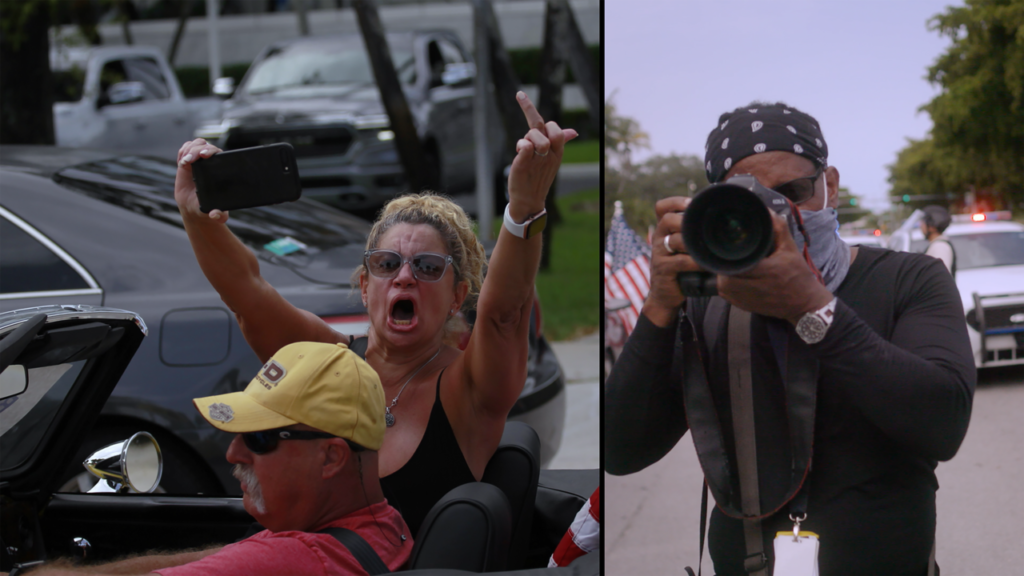Heidi Ewing and Rachel Grady are the directors of the Academy Award-nominated “Jesus Camp,” Peabody Award winners “The Boys of Baraka” and “12th & Delaware,” Emmy winner “Detropia,” “Norman Lear: Just Another Version of You,” “One of Us,” and “Love Fraud.” They own and operate Loki Films in Brooklyn.
“Endangered” is screening at the 2022 Tribeca Film Festival, which is taking place June 8-19.
W&H: Describe the film for us in your own words.
HE: “Endangered” follows four intrepid journalists for one dramatic year, 2020, as they attempt to make sense of a world out of balance. Around them newsrooms shutter, misinformation proliferates, and world leaders use Covid to suppress free speech. But our characters Carl, Sashenka, Oliver, and Patricia have taken an oath to the truth and are determined to press on, despite the high stakes consequences.
It was a privilege to gain insight into a few of the unassuming beat reporters who hit the streets every day to bring us the urgent news of the day.
W&H: What drew you to this story?
HE: We’ve never in our lifetime seen such hostility towards facts and against those who bring us those facts. Everyone seems ready to shoot the messenger on sight. It seemed like the time to create a filmic record of this strange and scary moment in history.
W&H: What do you want people to think about after they watch the film?
HE: Many of us living in democratic nations take freedom of the press for granted, but while making this film, we realized that to survive, this “right” must be fought for every single day. As governments and the public look more askance at the media, we need to bring press freedom to the top of our minds and on the tip of our tongues as part of the basic menu of values and rights we embrace as a democracy.
W&H: What was the biggest challenge in making the film?
HE: COVID, of course! The virus struck one week into production and travel restrictions went into place. We had to hustle to find talented and brave filmmakers in Mexico and Brazil to keep shooting and following our subjects in the Loki Films style, which is very specific.
W&H: How did you get your film funded?
HE: HBO, baby! Our co-EP Ronan Farrow had a deal set-up with HBO and came to us about brainstorming ideas for a potential film to do together. One of the first and most urgent ideas we talked about was what he calls the “minefield of misinformation, anti-press authoritarian politics, and faltering media business models” that reporters around the world navigate to bring us the truth. Rachel and I shared with Ronan the concern that press freedom was slipping in neighboring countries, and in our own. The execs at HBO — total pros who we have had the pleasure of working with in the past — liked the idea and were off to the races.
“Endangered” airs on HBO and HBO Max June 28.
W&H: What inspired you to become a filmmaker?
HE: After I graduated Georgetown University I moved to LA and at some point I took a night class at UCLA taught by Bram Roos (RIP). He had been filming the Dalai Lama and showed us dailies. I couldn’t believe you could just grab a camera and go knock on the door and talk to the Dalai Lama, or any other person you may be curious about. The profession is an incredible entryway to understanding the world around us and I was in.
Rachel and I met a few years later and it was clear we shared the infinite curiosity it takes to be a lifelong doc filmmaker. That’s why Loki Films is still here!
W&H: What’s the best and worst advice you’ve received?
HE: Best asdvice: Be original, no matter what. Originality is rewarded.
Worst: Keep your head down.
W&H: What advice do you have for other women directors?
HE: Hire other women. In every role possible. Try not to co-direct with a man if you don’t have to. He will definitely get all the credit. Sorry, it’s just true.
W&H: Name your favorite woman-directed film and why.
HE: I love all the films of Agnès Varda – a total kook. An original. Broke the mold. RIP.
W&H: How are you adjusting to life during the COVID-19 pandemic? Are you keeping creative, and if so, how?
HE: We never stopped working. Kept the business open. Kept shooting (carefully), developing, reading, writing. Well-adjusted to this new normal, I guess!
W&H: The film industry has a long history of underrepresenting people of color onscreen and behind the scenes and reinforcing — and creating — negative stereotypes. What actions do you think need to be taken to make Hollywood and/or the doc world more inclusive?
HE: I see steps being taken all around me every day to hire more people of color. There is always more to be done, but I think things are in a positive moment of change. As business owners we should all be hiring those who do not look like us and that are not from our same backgrounds. This will make everything better, including the films.







